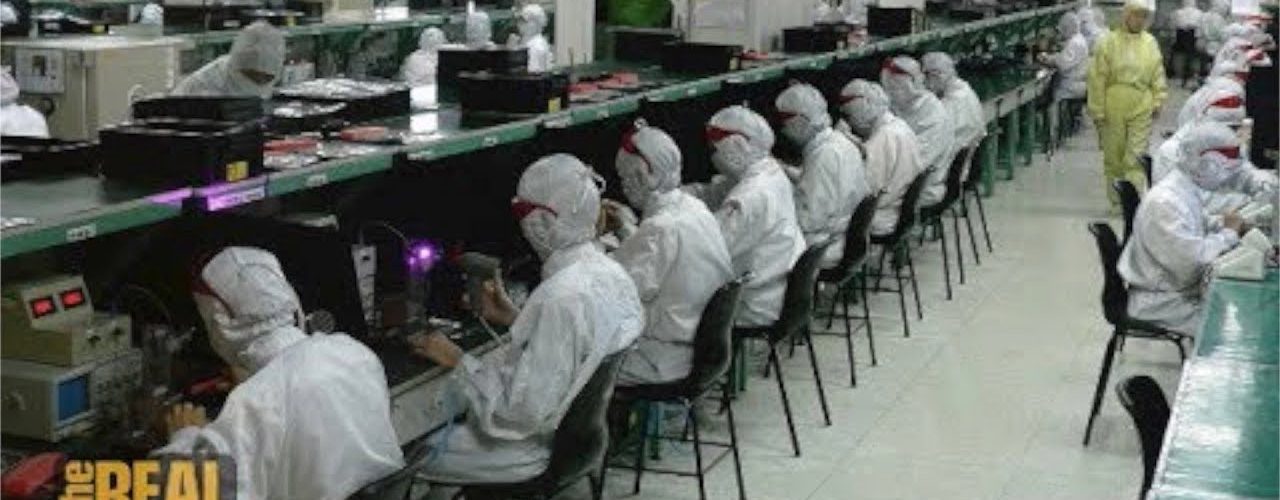The ability of nation states to regulate capital in the interests of their own citizens, workers and society was increasingly constrained in the 1980s by an international legal architecture says Jayati Ghosh explaining the shift to implicit power relations as imperialism goes through a different form in the 21st Century form.
June 28, 2017 Produced by Lynn Fries
TRANSCRIPT
Lynn Fries: This is The Real News. I’m Lynn Fries in Geneva. And this is Part 2 of a conversation on Imperialism in the 21st Century with our guest, Jayati Ghosh. A professor of economics at Jawaharlal Nehru University, Jayati Ghosh is based in India, New Delhi and is here in Geneva for a visit. Welcome.
Jayati Ghosh: Thank you.
Lynn Fries: In Part 1 you explained that under the logic of neoliberalism what matters is economic growth. And to get economic growth, the state needs to incentivize large capital to invest as it is large capital that’s going to deliver the good. And based on this logic, the role of the state is to protect the interests of large capital and so incentivize investment. Talk now about how an international legal and institutional architecture was created to enforce those protections.
Jayati Ghosh: You really find the origins of this new legal, institutional architecture globally in the early 1980s. And it was a response of capital in the advanced economies through this feeling that just asking for policies in different countries is not good enough. You need to bind states in. You need to bind governments in to a deregulatory system. So in fact, the WTO negotiations were, I believe in a way, the classic beginning of this because they were new in many different ways. People talk about how the WTO was a big change from the previous GATT, you know the General Agreement on Trade and Tariffs, because of the fact that it brought in agriculture, textiles and clothing. Things that were earlier kept out of the trade agreements. But I would argue that, in fact, the major point about those Uruguay Round negotiations is that they brought in non-trade issues, for the first time.
Well, of course, they brought in trade in services, which had also earlier been kept out but they brought in investment through the TRIMS Agreement, Trade-Related Investment Measures. And most of all, they brought in intellectual property rights, which were seen earlier as a completely national policy measure in which governments had complete autonomy. So you brought in these non-trade issues and you were basically binding nation-states down to a certain way of regulating or deregulating. This began with WTO, but as we know, since then it’s really been WTO plus. We’ve had a proliferation of different trade agreements – bilateral, plurilateral, regional, mega-regional and so on. And each of them is really WTO plus in terms of the additional things that it is asking nation-states to do. In addition, we have bilateral investment treaties which are all about investment protection. And what does that mean? It really means, limits on governments’ powers to regulate investment for all kinds of things.
And of course, the history of that is quite extraordinary. We have seen governments have to pay fines for things like not allowing enough advertisement of smoking, cigarette companies, because of health reasons. We have seen governments being fined because they have not allowed environmental pollution by companies. We have seen governments lose cases where they are asking companies not to pollute municipal water supply. So, in fact, the ways in which this has … We have seen governments being told that they’re not allowed to have additional taxation on companies because all of this affects what is called the profitability of the companies. Which many of these courts have interpreted as expropriation of investment very, very loosely defined.
What does all of this do? It basically means that governments are now more and more constrained in terms of how much they can actually do to regulate capital in the interests of their own citizens, workers and society at large. This really means that large capital now doesn’t have to use the power of a single state. It doesn’t have to say, “You better do what I say, because the United States’ government is backing me.” Instead, it can simply say, “I’m sorry, the global rules are such, you are not allowed to do this. And if you do this, I will take you to an arbitration and you will lose.”
Lynn Fries: Comment on some of the background to the transformative change in the structure of global production and trade during this era.
Jayati Ghosh: If you look at the big changes in the global economy in the last three decades, I think everyone will agree that one of the biggest changes has been the sort of globalization of production. The emergence of global value chains, the fact that the production process has been broken up into different parts and is all over the world. And this has created much greater competition across countries but it has also enabled some countries to enter into industrialization that would not have been possible earlier. This is broadly what everyone sees. Now, how did that happen?
People talk about ICT as one of the major changes that have changed the face of production as we know it. And that is certainly true. Information and communication technology [ICT] has been very significant in many, many ways. But I would argue that trade globalization has been fundamentally affected by a different thing, which is the advances in container technology that occurred in the 1980s. And, in fact, if you look at it, the huge improvements in shipping and how goods were transported, which really brought down the costs of transport to a fraction of what they were, these were fundamental in enabling the globalization of trade.
What did they do? They enabled large volumes of goods to be transported very, very long distances and arrive quite fresh, in a sense, rapidly and not stale, not used up, not past the sell-by date. Secondly, they enabled different parts of the production process to be broken up. So you could, even for a garment, you could do the cutting of the cloth somewhere, the zip fastener somewhere else, the buttons somewhere else and put everything together in a final place. For an entire range of electronic goods as well, similar. In other words, the transport element of production was reduced dramatically in terms of costs.
And this is really what has enabled not just the emergence of global value chains but the significance of China as the exporter to the world. It’s this improvement in container technology coupled with the fact that there was period of significantly declining energy prices, oil prices came down. All of that reduced the costs of transport massively. And this was very much part of the global relocation of production that we’ve seen.
Now what was the other implication of this? We have to see this technological shift along with the organizational and institutional changes that we’ve been talking about. In terms of the fact that various trade agreements and international rules made it much more profitable and enabled large capital to actually demand certain conditions in each of the places where they were producing and to concentrate the most profitable aspects of the entire process in their home countries. This is what has created what is now known as the smiley curve. And it is certainly a big smile for large capital. It’s not so much of a smile for the entire range of developing world where things are actually produced.
Lynn Fries: What does the smiling curve tell us?
Jayati Ghosh: What does the smiling curve say? It’s basically saying that the pre-production and post-production aspects of any good are the ones where all the profits are made. That’s where the profits are high. Where are the profits really low and rock-bottom is in the actual production. It’s when you actually are making the thing. There are many examples of this. People talk about the Apple iPhone as the classic example, where the actual cost of making the iPhone is about seventy,eighty dollars but of course it costs seven hundred dollars plus for a consumer anywhere in the world. And why does that happen? Because the design element is taking a huge share of the surplus and of the profits and then the marketing and branding element is similarly taking a huge share of the surplus. So the people who are making the iPhones, the workers in China and elsewhere, the people who are actually involved in that production, they get a pittance, including the companies that are involved in the outsourced production. Whereas Apple makes this enormous sum of money, which has made it one of the largest corporations in the world and certainly its reserves are larger than those of most developing countries and all of that.
But what is evident in Apple is true for an entire range of goods. The Barbie Doll was an example that was taken earlier by people who wrote about these things. Even clothes, whether it is Benetton or Zara, etcetera, the profits are made in the design and in the branding and marketing. The profits are barely made at all in the actual production. Developing countries, they’re all fighting with each other to actually be the place where these things are made or produced. And so we bid ourselves down to the lowest possible. And companies keep threatening to relocate or to outsource elsewhere, in a very successful effort to keep all of this down.
Lynn Fries: How do international trade and investment agreements play into this dynamic?
Jayati Ghosh: All of this is dramatically aided by these trade and investment agreements. Because what they do is they give huge returns to intellectual property rights. They enforce intellectual property rights of an extreme nature which really limit the possibilities of copying and emulation which have been the basis of industrialization everywhere. And they force excessive returns to both design and branding and marketing. So the intellectual property element has been hugely important. And you combine that with the investment rules that are increasingly evident in many of these agreements and governments are in a bind. They cannot actually … Companies can take governments to court very, very easily. Governments, if they try and regulate those companies, find that they are under all kinds of constraints and restrictions.
Lynn Fries: Is the definition of investment itself problematic in these legally binding protections that were meant to incentivize productive investment?
Jayati Ghosh: Yes, one of the things which we don’t adequately recognize which is so dangerous about many of these agreements is that they have, of course, a very loose definition of expropriation, but they also have a really loose definition of investment. They include not just productive, greenfield investment but mergers and acquisitions and also all kinds of financial investment, portfolio investment, even lending is sometimes classified as investment.
Now what does that mean? It means that any kind of capital flow can actually get all of these protections. A lot of this capital flow is not designed to actually increase the productive capacity in an economy in any way. Even often what is called FDI [Foreign Direct Investment], people think FDI at least is safe and long term and so on. That’s not true anymore. In India, for example my own country, more than half of the FDI in the last ten years has been of private equity firms. And private equity firms basically come, they buy up existing assets with the idea that they will sell them off. They will break them up into pieces and sell them off to get capital gains. And that’s really not increasing productive assets. That’s decreasing them, in a way, and it’s adding to instability. Similarly portfolio capital, it’s entirely designed to take advantage of changes in market measures and to actually get profits from the change in valuation.
So all of these things, of course, mean that governments cannot control this very destabilizing speculative kind of capital flow but it also means that those who are engaged in productive activity themselves have to keep a constant look out for what is happening to their shares, the value of their shares in the market, to what is happening to their ability to access capital through either portfolio flows or borrowing and therefore their own orientation becomes more and more short term.
Lynn Fries: We are going to break and be back with our guest, Jayati Ghosh, for the next and closing segment of this conversation on Imperialism in the 21st Century. Jayati Ghosh, thank you.
Jayati Ghosh: Thanks very much
Lynn Fries: And thank you for joining us on The Real News Network.
END TRANSCRIPT
Jayati Ghosh is Professor of Economics at Jawaharlal Nehru University in New Delhi, Executive Secretary of International Development Economics Associates and co-recipient of the International Labour Organisation’s 2010 Decent Work Research prize.
Originally published at TRNN



